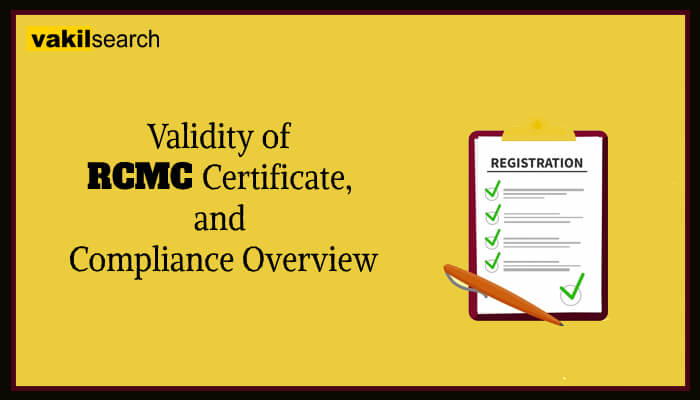The CMC certificate is a legal document issued by the Foreign Trade Policy's export promotion council. It is a document that legalizes exporters who work with products that have been registered with a government authority or agency. Exporters are required to register with their respective export promotion councils under the FTP, stating their core business. You will learn everything about the RCMC certificate from the Export Promotion Council in this article.
Introduction of validity of RCMC Certificate
There are currently 26 Export Promotion Councils and 9 commodity boards in operation across India. Export Promotion Councils are government-run organizations that have sole authority to issue RCMC certificates to exporters. Every export promotion council divides itself into categories based on the products it promotes. Exporters of products that are not covered by these councils can obtain RCMC from the Federation of Indian Export Organisations.
RCMC Certificate Registration Procedures
An applicant must declare their core business when applying for an RCMC certificate.
Exporters can acquire RCMC from Shellac and Forest Product Export Promotion Council, which deal with various products and have registered offices in north-eastern states, except the products are controlled by institutions such as the Spices Board, Tea Board, and APEDA.
How Do I Apply for the Export Promotion Council’s RCMC
Any exporter can obtain an RCMC certificate from the relevant EPC by submitting the following application along with the required documentation:
Note: The Director General of Foreign Trade (DGFT) recently unveiled a single-window portal for RCMC/Registration Certificate (RC) related processes, including new/renewal/amendment of RCMC/RC applications.
Exporters are encouraged to submit applications for RCMC/RC or renewals through this portal beginning December 6, 2021. The authority hopes to digitize and thus speed up RCMC/RC-related processes with the launch of this portal. This blog would further answer “How to Get RCMC Certificate Online” in detail.
Documents Required to Obtain an RCMC Certificate from the Appropriate Export Promotion Council
The following are common documents required to achieve Register Cum Membership Certificate from the EPC:
- Application in the suggested format (accessible for download on the authority’s website)
- A self-certified copy of the Directorate General of Foreign Trade’s IEC. Where IEC refers to import-export code.
- A declaration printed on non-judicial stamp paper that has been duly notarized.
- Depending on the type of business structure, an exporter or manufacturer may be required to submit a certificate such as an industrial license, letter of intent, or SSI certificate from the governing authority.
- A self-attested copy of the factory license, EPFO registration, and ESIC certificate was issued by the proper authorities.
- Amount demanded by the export promotion council (DD/cheque/pay order)
RCMC Compliance Overview and Its Validity
The RCMC has a 5-year validity period and provides various benefits and advantages to EXIM businesses.
Every exporter must provide the registering authority with export-oriented returns and details. If the exporter has an FIEO registration, he must also file quarterly returns in the standard format with FIEO.
Notification of a change in the RCMC holder’s business model
If the exporter’s constitution, ownership, name, or address changes, the exporter must notify the government. The exporter must notify the appropriate authority within one month of the change.
Penalty for Breaking the Terms and Conditions of Registration
In the event of a breach of the registration’s terms and conditions, the EPC may temporarily halt the exporter’s operation by canceling the registration. The defaulter would be notified of the registration cancellation decision so that he or she could present the case to the hearing committee.
Benefits Available to Holders of an RCMC Certificate
RCMC holders are eligible for the following benefits, which help them stay competitive and carry out EXIM activities more easily.
Advanced Permissions
The Foreign Trade Policy 2015-2020 includes a government scheme called the Advance Authorisation Scheme (AAS). The scheme ensures that all raw materials imported into India for the production of exportable goods are duty-free. AAS aspires to:
- Increased visibility of Indian products in international markets
- lowering the cost of producing exportable goods by providing low-cost raw materials
- Increasing export activity
Duty Refund Program
The duty drawback system enables exporters to provide a cashback on customs duty paid on goods imported from other countries if they are:
- To be prepared, allowed to treat, or combined with other exportable goods
- Since their importation, they have been exported unused.
Scheme RODTEP
The acronym of RoDTEP is Remission of Duties and Taxes on Export Products. This scheme took effect on 1 January 2021, and it was created to replace the existing Merchandise Exports from India Scheme or MEIS. The scheme aims to recover refunds on embedded taxes and duties that have been paid to the appropriate authorities. This scheme was established by the government to boost export activities across India.
Scheme for Duty-Free Import Authorization (DFIA)
The Duty-Free Import Authorization (DFIA) Scheme ensures the duty-free import of inputs, fuel, oil, and energy sources needed to produce exportable goods.
EPCG (Export Promotion Capital Goods) Is a Zero-Duty Scheme.
As long as an export obligation of six times the duty kept on capital goods imported under the EPCG scheme is encountered within six years of the authorization issue date, the EPCG scheme allows for zero-duty importation of capital goods, including spares for production, pre/post-production.
Aside from these advantages, holders of the RCMC have seamless access to domestic and international trade shows and exhibitions.
Conclusion
The Export Promotion Council’s RCMC certificate enables exporters to take advantage of growth-oriented schemes outlined in the Foreign Trade Policy. Once registered, RCMC holders can take advantage of benefits such as reduced shipping costs, zero import duty on input materials used in exportable goods, and smooth transit of goods.
Read More:




